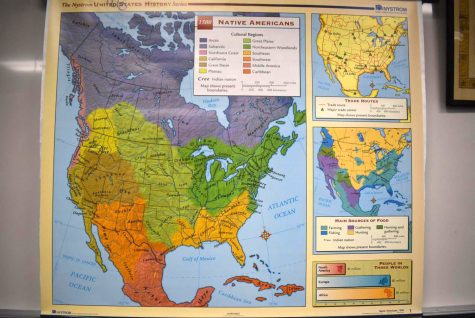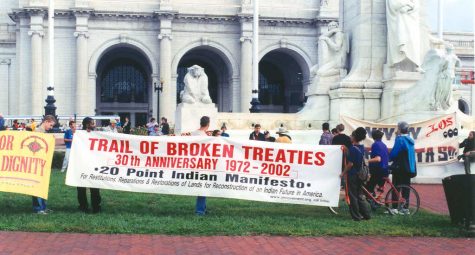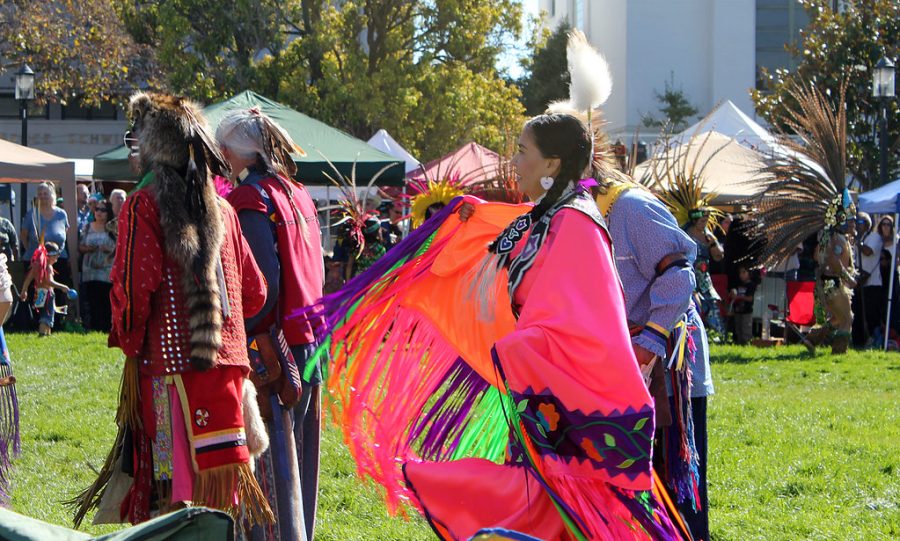Columbus Day has long been seen as a moment celebrating the discovery of the Americas. While this celebration is beloved by many, what it often fails to acknowledge is the many atrocities committed by Christopher Columbus and his crew when making this accidental discovery. Many states have made the decision to replace Columbus Day with another holiday, Indigenous Peoples’ Day, which falls on the same day, Oct. 11.
For some states, Columbus Day and Indigenous Peoples’ Day operate as separate holidays. For others, Indigenous Peoples’ Day has officially replaced Columbus Day. This year, whether Indigenous Day is a separate holiday or not, Columbus Day and Indigenous Peoples’ Day fall on the same day.
Columbus day is often celebrated as a recognition of Italian heritage and was first adopted in 1937 as a federal holiday. The Festival on the Hill has been a St. Louis tradition since 1867, focusing on Italian-American organizations, restaurants and businesses on the Hill, long before Columbus Day was formally established. The festival has plans to continue whether or not Columbus remains associated with it, according to the St. Louis Post Dispatch.
While the celebration of Columbus Day comes with good intentions, as a celebration of Italian Heritage, the holiday itself is problematic not in its intentions of celebration, but who it is celebrating itself. Christopher Columbus is seen by many as a hero and an adventurer, the discoverer of the Americas. This is an idea enhanced by the American education system, an idea that erases the histories of Indigenous peoples and the pain caused to them. Reforming the lessons taught within schools is just one step in moving away from the whitewashed history that many Americans are taught today. Along with replacing Columbus Day with Indigenous Peoplesʼ Day, the education system needs to be reformed in order to shift away from the eurocentric viewpoint that is currently taught.
The issue of inadequate representation of Indigenous histories is further pushed through the celebration of Columbus Day which established a set of American values that are still in conflict to this day. Establishing this day as a federal holiday perpetuates American colonization and the idea of American exceptionalism surrounding the holiday covers up the decimation of the Indigenous people who had lived in the area previously.

Another common misconception that people fail to recognize about Columbus Day is that Columbus was not, in fact, the first person to discover the Americas, with approximately 60 million people living in the Americas prior to European colonization. Columbus Day attempts to cover up the pasts, lives and traditions of natives within the Americas and the everlasting impact that Columbus’s voyage had on them.
Not only does Columbus overshadow the natives who already inhabited the Americas, but the idea that he was the first to discover the Americas is widely disputed. There are many theories on who first arrived in the Americas, yet the most widely accepted theory is that before Columbus, the Vikings made their way to the Americas in the 10th century, almost 500 years before the arrival of Christopher Columbus and his crew.
Indigenous Peoples’ Day was adopted in 1991 and to this day is observed in 10 different states. This holiday contrasts Columbus Day in terms of the values it holds, choosing to celebrate the cultures and heritages of Indigenous peoples. Meanwhile, Columbus Day celebrates a fabricated reality of the Americas that fails to address its true history. The history of Columbus Day is one in which the people who had previously inhabited the land were met with death, disease and enslavement from the supposed discoverers that we celebrate today. European colonization within the Americas resulted in the death of 90 percent of Indigenous populations, a death rate higher than that of the Black Death in Europe.

Celebrating Columbus Day is selfish when considering the pain and suffering that Columbus has caused. While there is nothing wrong with celebrating heritage, Columbus highlights a painful history to Indigenous peoples and a failure by the United States government to recognize and compensate for these tragedies. Columbus Day should be removed for the full encompassment of Oct. 11 as Indigenous Peoples’ Day.
Almost the entirety of the native population was wiped out with the arrival of Europeans, beginning first with Christopher Columbus and his men. This is a tragedy that should not be ignored and overshadowed by the celebration of the man responsible for many of these deaths. To celebrate Columbus Day is to celebrate the deaths of millions.
Indigenous Peoples’ Day acts as a direct contrast to the legacy of death and destruction brought by Columbus. Columbus day represents a eurocentric view on the establishment of colonies within the Americas as people tend to focus on the benefits of colonization to Europe rather than the pain and suffering that these settlements caused to Indigenous peoples.
Columbus Day has long been a day of contention and protest among Indigenous people. Various protests, including the tearing down of statues of Christopher Columbus, have plagued this holiday and its tradition of honoring genocide. According to the St. Louis Public Radio, the statue of Christopher Columbus was removed from Tower Grove Park following protests over the death of George Floyd, where statues of historical figures were frequently vandalized or removed altogether. The city plans on placing a new statue onto the pedestal with petitions calling for a statue of Joesphine Baker, a black artist, though who the statue will be of remains undecided.

Columbus Day is a holiday of conflict not just in terms of who it celebrates, a man who caused the death and destruction of thousands of people, but also due to the type of people who have taken the holiday as their own. By choosing to continue to recognize Columbus Day as a national holiday rather than replacing it with the celebration of Indigenous Peoples’ Day, states are demonstrating a tolerance for eurocentric viewpoints on history that ignore the lives and values of the people who had lived in the Americas previously.
As a country, we are still ridiculously tolerant of measures that disrupt Indigenous peoples’ livelihoods and well being. Natural gas giant Enbridge began filling its highly contested Line 3 Oct. 1, a pipeline that violates the treaty rights of Anishinaabe peoples and nations by running through their wild rice fields and lands. The Biden administration refused to revoke federal permits, exploiting Indigenous peoples for economic benefits.
While the wrongs brought onto Indigenous peoples are not something that can be erased by replacing Columbus Day with Indigenous Peoples’ Day, the ridding of Columbus Day would allow for the recognition of the pains that Columbus had caused, while also expanding the worldview of Americans who have so often been taught a whitewashed version of history.
In order to continue to right the wrongs that Indigenous peoples have faced throughout history, the removal of Columbus Day as a national holiday is a necessity. Supporting Indigenous people on a day that downplays their history can take many forms. Research Indigenous cultures, call senators for the removal of Columbus Day as a national holiday, attend protests of Columbus Day or celebrations of Indigenous cultures. The suffering that Columbus caused cannot be undone, but we as people can work to recognize the tragedies and celebrate the cultures of the people impacted by these acts.



![Sophomore Maryem Hidic signs up for an academic lab through Infinite Campus, a grading and scheduling software. Some students enjoyed selecting their responsive schedule in a method that was used school-wide last year. “I think it's more inconvenient now, because I can't change [my classes] the day of, if I have a big test coming and I forget about it, I can't change [my class],” sophomore Alisha Singh said.](https://pwestpathfinder.com/wp-content/uploads/2025/10/DSC_0012-1200x801.jpg)
![Senior Dhiya Prasanna examines a bottle of Tylenol. Prasanna has observed data in science labs and in real life. “[I] advise the public not to just look or search for information that supports your argument, but search for information that doesn't support it,” Prasanna said.](https://pwestpathfinder.com/wp-content/uploads/2025/10/DSC_0073-2-1200x800.jpg)
![Junior Fiona Dye lifts weights in Strength and Conditioning. Now that the Trump administration has instituted policies such as AI deregulation, tariffs and university funding freezes, women may have to work twice as hard to get half as far. "[Trump] wants America to be more divided; he wants to inspire hatred in people,” feminist club member and junior Clara Lazarini said.](https://pwestpathfinder.com/wp-content/uploads/2025/05/Flag.png)
![As the Trump administration cracks down on immigration, it scapegoats many immigrants for the United States’ plights, precipitating a possible genocide. Sophomore Annabella Whiteley moved from the United Kingdom when she was eight. “It’s pretty scary because I’m on a visa. When my visa expires next year, I’m not sure what’s going to happen, especially with [immigration] policies up in the air, so it is a concern for my family,” Whiteley said.](https://pwestpathfinder.com/wp-content/uploads/2025/05/DSC_0077-7copy.jpg)
![Shifting global trade, President Donald Trump’s tariffs are raising concerns about economic stability for the U.S. and other countries alike. “[The tariffs are] going to pose a distinct challenge to the U.S. economy and a challenge to the global economy on the whole because it's going to greatly upset who trades with who and where resources and products are going to come from,” social studies teacher Melvin Trotier said.](https://pwestpathfinder.com/wp-content/uploads/2025/05/MDB_3456-1200x800.jpg)



![Some of the most deadly instances of gun violence have occurred in schools, communities and other ‘safe spaces’ for students. These uncontrolled settings give way to the need for gun regulation, including background and mental health checks. “Gun control comes about with more laws, but there are a lot of guns out there that people could obtain illegally. What is a solution that would get the illegal guns off the street? We have yet to find [one],” social studies teacher Nancy Sachtlaben said.](https://pwestpathfinder.com/wp-content/uploads/2025/01/DSC_5122-1200x800.jpg)

![After a thrilling point, senior Katie Byergo and junior Elle Lanferseick high-five each other on Oct. 8. With teamwork and camaraderie, Byergo worked together in the game against Lafayette High School. “[Byergo’s] is really positive with a good spirit,” Lanferseick said. “I set her [the ball] and she hits it [or] gets the kill.”](https://pwestpathfinder.com/wp-content/uploads/2025/10/DSC_9349-1-e1761159125735-1200x791.jpg)
![Focused on providing exceptional service, sophomore Darsh Mahapatra carefully cleans the door of a customer’s car. Mahapatra has always believed his customers deserve nothing less than the best. “[If] they’re trusting us with their car and our service, then I am convinced that they deserve our 100 percent effort and beyond,” Mahapatra said.](https://pwestpathfinder.com/wp-content/uploads/2025/10/DSC_0018-1200x800.jpg)
![Sophomore Aleix Pi de Cabanyes Navarro (left) finishes up a soccer game while junior Ava Muench (right) warms up for cross country practice. The two came to Parkway West High School as exchange students for the 2025-2026 school year. “The goal for the [exchange] program is to provide opportunities for both Parkway students and our international exchange students to learn about other cultures, build connections and become confident, capable, curious and caring — Parkway’s Four C’s — in the process,” Exchange Program Lead Lauren Farrelly said.](https://pwestpathfinder.com/wp-content/uploads/2025/10/Feature-Photo-1200x800.png)
![Leaning on the podium, superintendent Melissa Schneider speaks to Parkway journalism students during a press conference. Schneider joined Parkway in July after working in the Thompson School District in Colorado. “My plan [to bond with students] is to get things on my calendar as much as possible. For example, being in [classes] is very special to me. I am trying to be opportunistic [meeting] kids [and] being in [the school] buildings. I have all the sports schedules and the fine arts schedules on my calendar, so that when I'm available, I can get to them,” Schneider said.](https://pwestpathfinder.com/wp-content/uploads/2025/09/IMG_5425-1200x943.jpeg)
![Gazing across the stage, sophomore Alexis Monteleone performs in the school theater. The Monteleone family’s band “Monte and the Machine” has been releasing music since 2012, but Alexis started her own solo career in 2024 with the release of her first single, Crying Skies. “My whole family is very musical, [and I especially] love writing [songs with them],” Monteleone said.](https://pwestpathfinder.com/wp-content/uploads/2025/09/DSC7463-1200x798.jpg)

![Leaping through the air, senior Tyler Watts celebrates his first goal of the season, which put the Longhorns up 1-0 against the Lafayette Lancers. Watts decided to play soccer for West for his last year of high school and secured a spot on the varsity roster. “[Playing soccer for West] is something I had always dreamed of, but hadn’t really had a good opportunity to do until now. It’s [really] fun being out [on the field], and I’m glad I decided to join the team. It’s just all about having fun with the boys and enjoying what time we have left together,” Watts said.](https://pwestpathfinder.com/wp-content/uploads/2025/09/DSC_1951-1200x855.jpg)


![Pitching the ball on Apr. 14, senior Henry Wild and his team play against Belleville East. Wild was named scholar athlete of the year by St. Louis Post-Dispatch after maintaining a high cumulative GPA and staying involved with athletics for all of high school. “It’s an amazing honor. I feel very blessed to have the opportunity to represent my school [and] what [it] stands for,” Wild said.](https://pwestpathfinder.com/wp-content/uploads/2025/05/unnamed-6-1200x714.jpg)


Emily Early • Oct 12, 2021 at 12:42 pm
This is so well written, you did an amazing job.